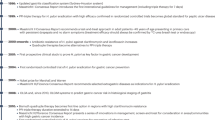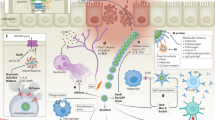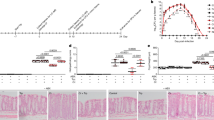Abstract
Infection of laboratory mice with Helicobacter spp. is a serious problem for many laboratory animal facilities worldwide. Rederivation and antibiotic treatment are two of the most common methods used to eliminate the bacterial infection from rodent colonies. Forty-seven newly imported mice were suspected to be positive for Helicobacter infection based on PCR analysis of pooled fecal samples from sentinel animals. We treated the mice with a medicated feed containing four antibiotic compounds (amoxicillin, clarithromycin, metronidazole, omeprazole). After eight weeks of continuous administration the animals were negative for H. bilis and H. hepaticus. Frequent retesting of the animals for up to one year proved that the mouse colony remained negative for Helicobacter spp.
This is a preview of subscription content, access via your institution
Access options
Subscribe to this journal
We are sorry, but there is no personal subscription option available for your country.
Buy this article
- Purchase on Springer Link
- Instant access to full article PDF
Prices may be subject to local taxes which are calculated during checkout


Similar content being viewed by others
References
Fox, J.G. et al. Helicobacter hepaticus, a novel Helicobacter species isolated from livers and intestinal mucosal scrapings from mice. J. Clin. Microbiol. 32(5), 1238–1245 (1994).
Whary, M.T. & Fox, J.G. Detection, eradication, and research implications of Helicobacter infections in laboratory rodents. Lab. Anim. (NY) 35(7), 25–36 (2006).
Whary, M.T. & Fox, J.G. Natural and experimental Helicobacter infections. Comp. Med. 54(2), 128–158 (2004).
Marshall, B.J. & Warren, J.R. Unidentified curved bacilli on gastric epithelium in active chronic gastritis. Lancet 1(8336), 1273–1275 (1983).
Shomer, N.H., Dangler, C.A., Schrenzel, M. & Fox, J.G. Helicobacter bilis-induced inflammatory bowel disease in scid mice with defined flora. Infect. Immun. 65(11), 4858–4864 (1997).
Shomer, N.H., Dangler, C.A., Marini, R.P. & Fox, J.G. Helicobacter bilis/Helicobacter rodentium co-infection associated with diarrhoea in a colony of scid mice. Lab. Anim. Sci. 48(5), 455–459 (1998).
Ward, J.M., Anver, M.R., Haines, D.C. & Benveniste, R.E. Chronic active hepatitis in mice caused by Helicobacter hepaticus. Am. J. Path. 145(4), 959–968 (1994).
Fox, J.G. et al. Helicobacter bilis-associated hepatitis in outbred mice. Comp. Med. 54(5), 571–577 (2004).
Franklin, C.L. et al. Enterohepatic lesions in SCID mice infected with Helicobacter bilis. Lab. Anim. Sci. 48(4), 334–339 (1998).
Nicklas, W. et al. Recommendations for the health monitoring of rodent and rabbit colonies in breeding and experimental units. Lab. Anim. 36(1), 20–43 (2002).
Milner, D.J., Weitzer, G., Tran, D., Bradley, A. & Capetanaki, Y. Disruption of muscle architecture and myocardial degeneration in mice lacking desmin. J. Cell Biol. 134(5), 1255–1270 (1996).
Riley, L.K., Franklin, C.H., Hook, R.R. Jr. & Besch-Williford, C. Identification of murine helicobacters by PCR and restriction enzyme analyses. J. Clin. Microbiol. 34(4), 942–946 (1996).
Fox, J.G. et al. Helicobacter bilis, a novel Helicobacter species isolated from bile, livers, and intestines of aged, inbred mice. J. Clin. Microbiol. 33(2), 445–454 (1995).
Lipman, N.S. & Homberger, F.R. Rodent quality assurance testing: use of sentinel animal system. Lab Anim. (NY) 32(5), 36–43 (2003).
Livingston, R.S., Riley, L.K., Besch-Williford, C.L., Hook, R.R. Jr. & Franklin, C.L. Transmission of Helicobacter hepaticus infection to sentinel mice by contaminated bedding. Lab. Anim. Sci. 48(3), 291–293 (1998).
Compton, S.R., Homberger, F.R. & MacArthur-Clark, J. Microbiological monitoring in individually ventilated cage systems. Lab Anim. (NY) 33(10), 36–41 (2004).
Foltz, C.J., Fox, J.G., Yan, L. & Shames, B. Evaluation of antibiotic therapies for eradication of Helicobacter hepaticus. Antimicrob. Agents Chemother. 39(6), 1292–1294 (1995).
Foltz, C.J., Fox, J.G., Yan, L. & Shames, B. Evaluation of various antimicrobial formulations for eradication of Helicobacter hepaticus. Lab. Anim. Sci. 46(2), 193–197 (1996).
Kerton, A. & Warden, P. Review of successful treatment for Helicobacter species in laboratory mice. Lab. Anim. 40(2), 115–122 (2006).
Dzieniszewski, J. & Jarosz, M. Guidelines in the medical treatment of Helicobacter pylori infection. J. Physiol. Pharmacol. 57(Suppl 3), 143–154 (2006).
Jury, J., Gee, L., Delaney, K., Perdue, M. & Bonner, R. Eradication of Helicobacter spp. from rat breeding colony. Contemp. Top. Lab. Anim. Sci. 44(4), 8–11 (2005).
Hodzic, E., McKisic, M., Feng, S. & Barthold, S.W. Evaluation of diagnostic methods for Helicobacter bilis infection in laboratory mice. Comp. Med. 51(5), 406–412 (2001).
Jacobsen, K. et al. Monitoring a mouse colony for Helicobacter bilis using a Helicobacter–genus-specific nested PCR. Lab. Anim. 39(4), 400–412 (2005).
Acknowledgements
The authors acknowledge the contributions of Jennifer Jury (Department of Pathology and Molecular Medicine, McMaster University, Hamilton, Ontario, Canada), Alistair Thompson (Surrey Diagnostics, Surrey, UK) and Karen M. Froberg-Fejko (Bio-Serv, Frenchtown, NJ).
Author information
Authors and Affiliations
Corresponding author
Ethics declarations
Competing interests
The authors declare no competing financial interests.
Rights and permissions
About this article
Cite this article
Kostomitsopoulos, N., Donnelly, H., Kostavasili, I. et al. Eradication of Helicobacter bilis and H. hepaticus from infected mice by using a medicated diet. Lab Anim 36, 37–40 (2007). https://doi.org/10.1038/laban0507-37
Received:
Accepted:
Issue Date:
DOI: https://doi.org/10.1038/laban0507-37



